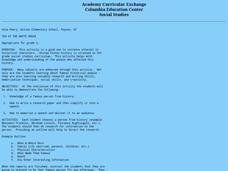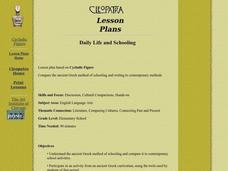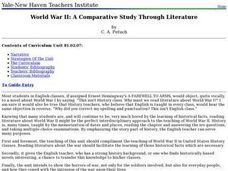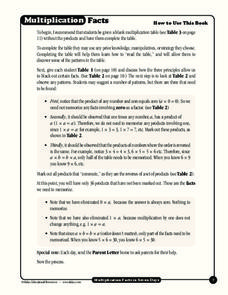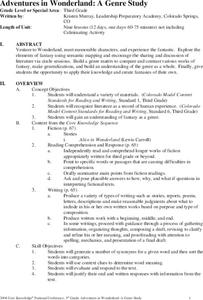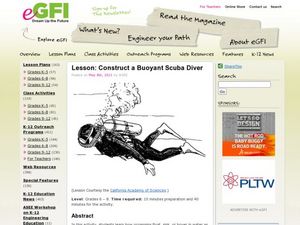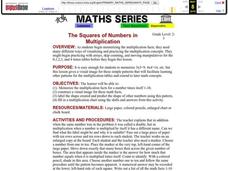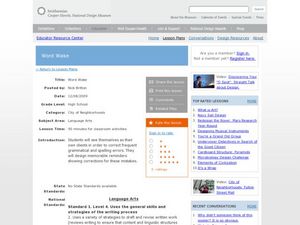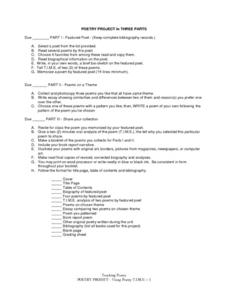Curated OER
Tea at the White House
Fifth graders write a research paper and turn it into a speech about a historical person in the United States. In this history lesson plan, 5th graders memorize the speech and present it to the class.
Curated OER
The Continents and Oceans of the World
Students explore world mapping skills. In this world geography lesson, students identify and label the continents and oceans on a world map using the Visual Thesaurus. Students generate mnemonic devices to help memorize these terms.
Curated OER
I Have a Dream
Learners use flip video cameras to film a speech about the 'I Have a Dream' speech. In this poetry and speech lesson, students listen to the speech from Dr. Martin Luther King Jr. Learners memorize part of the speech.
Curated OER
Astronomer Research
Young scholars discover the contributions of early astronomers and scientists. In this research skills lesson, students research electronic and print sources about Galileo Galilei, Aristarchus, Hipparchus, Claudius Ptolemy, Nicholas...
Curated OER
Analogies, Synonyms, Antonyms, Stories and Writing!
Students use analogies to compare synonyms and antonyms. In this writing skills lesson plan, students use the provided synonyms and antonyms to create short stories that they present as plays to their classmates.
Curated OER
Intermediate Sentence Completion Exercise 8
In this online interactive grammar skills worksheet, students examine 10 sentences that are missing words and select the appropriate words to complete each of the sentences and match them to the sentences. Student answers are...
Curated OER
Daily Life and Schooling
Students compare the ancient Greek method of schooling and writing to contemporary methods and learn the Greek alphabet on wax tablets.
Curated OER
World War II: A Compartive Study through Literature
Students examine World War II through the use of literature. As a class, they brainstorm a list of words they relate to the war itself. In groups, they read various novels and view photographs showing the experiences of the Jews,...
Curated OER
How Many Penguins Does It Take? Studying Carrying Capacity and Limiting Factors
How does a population's habitat determine the size of that population? Teach learners about carrying capacity and limiting factors with an engaging roleplay activity. Class members pose as a colony of penguins who must gather food amidst...
Curated OER
Case Study Two: Shark Dissection
Students read an article on sharks prior to beginning a dissection lab. As part of the lab, students identify differences between the shark anatomy and human anatomy and hypothesize why those differences exist.
Didax
Multiplication Facts
Learning their multiplication facts is a big step in the education of young mathematicians. Help achieve this goal with the support of this collection of instructional materials.
Curated OER
Adventures in Wonderland: A Genre Study
Students explore the concepts of fantasy writing through this nine lessons unit. The unit presents semantic mapping, discussions, comparisons of various works of fantasy, and the opportunity to create their own fantasies.
Curated OER
My Spelling Dictionary
Develop study skills and improve spelling at the same time. Every time I teach this mnemonic device, the kids thank me. It makes memorizing more manageable, and fun. To remember how to spell difficult words, make up a sentence using...
Curated OER
The Scarlet Letter Vocabulary Words--Set 1
Kids can practice using vocabulary from The Scarlet Letter as they play a vocabulary memory game based on words and definitions taken from the novel. They click to match words to definitions.
Curated OER
Hand Washing
Mostly discussion, this lesson explores the importance and methods of hand washing. A few true stories of community illnesses spread by the neglect of washing hands serve as an anticipatory set. The activity is most memorable if you are...
Curated OER
Construct a Buoyant Scuba Diver
Groups of young oceanographers get to use action figures to experiment with the property of buoyancy! This memorable lesson plan provides detailed background information, a link to the laboratory worksheet, and thorough instruction...
Curated OER
Finding Percentages
Here is an approach to calculating percent with 16 practice problems to solidify the skill. Two examples demonstrate dividing by 100 to get one percent and then multiplying by the percentage in question to get the solution. Learners find...
Curated OER
Rainbow Number Line
Guide your kindergartners to create memorable, colorful number lines that they will use throughout the school year. Using sentence strip and a black marker or card stock printed in a teachers font, create traceable numbers from 1 to 20...
The Science Spot
Cells & Organelles
Familiarize young biologists with the inner workings of eukaryotic cells with this vocabulary worksheet. By cutting out and matching a series of definitions and memorization tips to the organelles listed in the provided...
Curated OER
The Squares of Numbers in Multiplication
Review multiplication facts and concepts! This clear, and easy to follow lesson will help your class to understand multiplication by using arrays and repeated addition. There are strategies to help with memorization and manipulative...
Curated OER
Word Wake
Put your common writing errors to rest with this resource, which prompts high schoolers to create eulogies and tombstones for overused and incorrect words. They work on correcting common errors in spelling and usage mistakes in their own...
Illustrative Mathematics
Words and Music I
What type of music is best to listen to while learning? In a short writing prompt, learners must determine if a scenario involving listening to music while memorizing material is an experiment or an observational study. The prompt also...
Teaching English
Poetry Project in Three Parts
It’s poetry T.I.M.E! Individuals use the T.I.M.E. format (T = Title, thought, and theme; I = Imagery and figurative language; M = music and sound; E = emotion) to study a poet, collect poems that have a similar theme, and create a...
Curated OER
Heart to Heart
Candy conversation hearts make writing a sweet pastime. Fifth graders write narratives demonstrating a complete thought and correct punctuation. The trick here is that they must use the words on five candy conversation hearts as part of...


